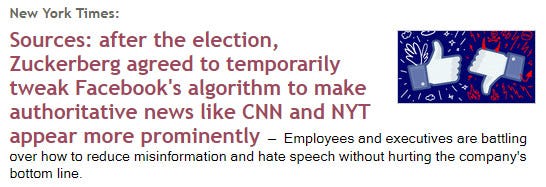Trump’s departure opens the door for increased social media censorship
Departing US President Trump attempted to push back against selective censorship by social media platforms. They’re less likely to face such resistance from Biden.
November 25, 2020

Departing US President Trump attempted to push back against selective censorship by social media platforms. They’re less likely to face such resistance from Biden.
There are already signs that the censors and their media enablers have become emboldened by the recent (presumed) US electoral result. Techmeme, a US aggregator of trending technology news, prominently features stories bemoaning insufficient censorship almost every day right now. Much of the US tech media is fairly open about its political bias in favour of the Democrat party and these stories usually call for censorship of content that is insufficiently supportive of President-elect Biden’s agenda.
One recent example is this hilarious headline from the pro-Democrat New York Times, which states as fact that itself and the even more left biased CNN have some kind of elevated authority. The clear inference is that social media algorithms should therefore prioritise them on the basis of this self-coronation.

One of the authors of that story was also offered an exclusive by activist organization Avaaz. The report claims “a set of right-wing commentators have been the top so-called superspreaders of election misinformation”.
“The superspreaders in this list, with the helping hand of Facebook’s algorithm, were just central to creating this flood of falsehoods that is now defining the political debate for millions across the country, and could continue to do so for years to come,” Fadi Quran of Avaaz told the NYT.
Avaaz has spent much of this year badgering Facebook to censor content it disapproves of. One of the achievements it’s most proud of is ridding the internet of government censorship and yet the same list also celebrates ‘Defeating the Murdoch Mafia’ which needed defeating because of its ‘hateful and divisive political agenda.’ See if you can guess in which political direction that alleged agenda points.
Then we have a (poorly written) recent letter from four Democrat Senators to the head of YouTube, moaning about content that contests the outcome of the election. At time of writing, while the outcome does seem to be resolved, there are still legal challenges underway in several closely-contested states, so it’s certainly legitimate to speculate about their outcome. The letter bases much of its complaint on the subjective concept of misinformation.
Unsurprisingly YouTube has also been the recipient of pressure from Avaaz which, at the start of this year, accused it of the equally subjective crime of ‘promoting climate denial’, i.e. allowing content that queries global warming dogma. Yet another forbidden topic is the discussion of viewpoints on the COVID-19 pandemic that deviate from the establishment consensus, causing YouTube to punish a news network that it has unilaterally determined to not be authoritative (that word again).
The list goes on. Twitter alternative Parler, which some conservatives have turned to in the hope that they won’t be censored, is once more the focus of negative scrutiny from the US tech press. Tomorrow Techmeme will probably feature another story bemoaning a social media deviation from the approved narrative, but it’s not clear what these vigilante censors think they will achieve. They have either never heard of the Streisand Effect or this has nothing to do with persuasion and everything to do with a crude projection of power.
About the Author
You May Also Like










.png?width=300&auto=webp&quality=80&disable=upscale)


_1.jpg?width=300&auto=webp&quality=80&disable=upscale)